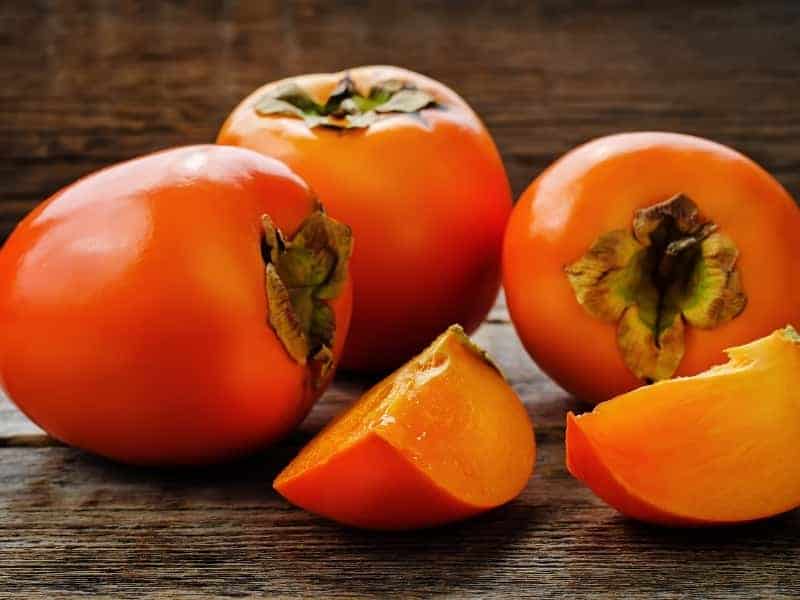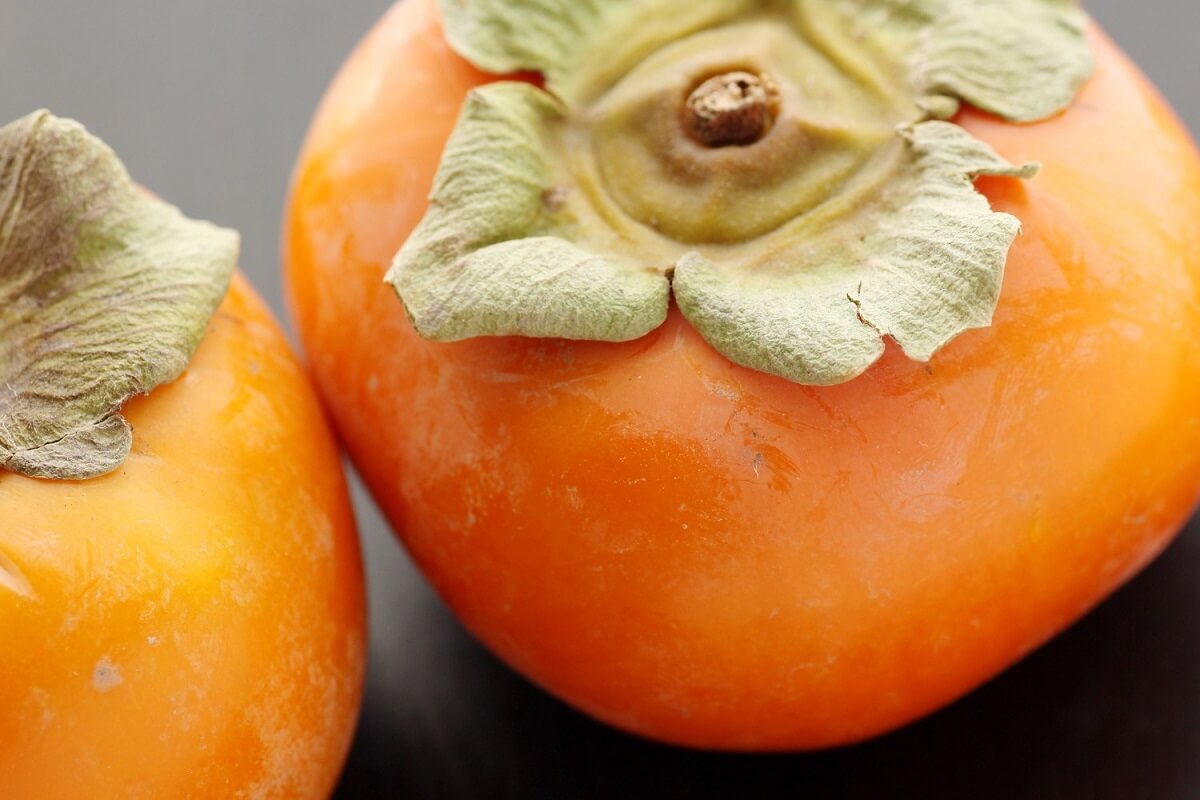Unveiling The Secrets: Persimmon Consumption During Pregnancy
The consumption of persimmons during pregnancy: A comprehensive analysis
Persimmons, with their vibrant hues and sweet flavors, are a nutritional powerhouse that has captivated people for centuries. However, when it comes to pregnancy, many expectant mothers wonder about the safety of consuming this delectable fruit. This article aims to delve into the topic of "Can I eat persimmon while pregnant?", providing valuable insights and comprehensive information to guide you through this culinary quandary.
As we embark on this exploration, we will uncover the nutritional benefits of persimmons, examining their potential impact on both the mother and the developing fetus. We will also address any concerns or precautions that may arise during pregnancy, ensuring that you make informed choices about your diet.
Can I Eat Persimmon While Pregnant?
Consuming persimmons during pregnancy is a topic that warrants careful consideration. To provide a comprehensive understanding, we will explore eight key aspects related to this question, encompassing various dimensions and perspectives.
- Nutritional Benefits: Persimmons are rich in vitamins, minerals, and antioxidants, offering essential nutrients for both the mother and fetus.
- Fetal Development: The nutrients in persimmons, such as vitamin C and iron, play a crucial role in supporting fetal growth and development.
- Dietary Fiber: Persimmons are a good source of dietary fiber, which can help regulate digestion and prevent constipation, common during pregnancy.
- Blood Sugar Regulation: Persimmons have a low glycemic index, meaning they release sugar slowly into the bloodstream, helping to manage blood sugar levels.
- Hydration: Persimmons are high in water content, contributing to the overall hydration of the mother during pregnancy.
- Immune Support: The antioxidants in persimmons, such as vitamin C and beta-carotene, can help boost the immune system, protecting against infections.
- Precautions: While persimmons are generally safe to consume during pregnancy, it's important to wash them thoroughly and limit intake due to their high tannin content, which can interfere with iron absorption.
- Individual Needs: Consulting a healthcare professional is always advisable to determine the appropriate amount of persimmon consumption based on individual needs and health conditions.
In conclusion, understanding the key aspects surrounding the question of "Can I eat persimmon while pregnant?" is essential for expectant mothers. By considering the nutritional benefits, potential impact on fetal development, and necessary precautions, informed choices can be made to safely incorporate persimmons into a healthy pregnancy diet.
Nutritional Benefits
The nutritional value of persimmons makes them a particularly beneficial fruit during pregnancy. The diverse array of vitamins, minerals, and antioxidants they contain play a vital role in supporting the health and well-being of both the mother and developing fetus.
- Vitamins and Minerals: Persimmons are a rich source of essential vitamins and minerals, including vitamin C, potassium, and manganese. These nutrients are crucial for fetal growth and development, supporting bone health, immune function, and overall well-being.
- Antioxidants: Persimmons are packed with antioxidants, such as beta-carotene and lycopene. These compounds help protect cells from damage caused by free radicals, reducing the risk of oxidative stress and promoting a healthy pregnancy.
- Dietary Fiber: Persimmons are a good source of dietary fiber, which aids in digestion and prevents constipation, a common discomfort during pregnancy.
- Hydration: Persimmons have a high water content, contributing to the overall hydration of the mother, which is essential for maintaining a healthy pregnancy.
In summary, the nutritional benefits of persimmons make them a valuable addition to a balanced diet during pregnancy. By providing essential vitamins, minerals, antioxidants, and dietary fiber, persimmons support the health and well-being of both the mother and developing fetus.
Fetal Development
During pregnancy, the developing fetus requires a range of essential nutrients to support its growth and development. Persimmons, with their rich nutrient profile, offer several key nutrients that are particularly important for fetal well-being.
- Vitamin C: Vitamin C is vital for the formation of collagen, a protein that is essential for the development of bones, cartilage, and skin in the fetus. It also plays a role in the absorption of iron, another crucial nutrient for fetal growth.
- Iron: Iron is necessary for the production of red blood cells, which carry oxygen throughout the body. Iron deficiency during pregnancy can lead to anemia, which can have adverse effects on both the mother and the fetus.
- Dietary Fiber: Persimmons contain dietary fiber, which is important for maintaining a healthy digestive system and preventing constipation, a common discomfort during pregnancy.
By providing these essential nutrients, persimmons contribute to the overall health and development of the fetus. Incorporating persimmons into a balanced pregnancy diet can help ensure that both the mother and the developing baby receive the necessary nutrients for optimal well-being.
Dietary Fiber
Dietary fiber, found abundantly in persimmons, plays a crucial role in maintaining a healthy digestive system during pregnancy. Here's how this facet connects to the question of "can I eat persimmon while pregnant":
- Preventing Constipation: Constipation is a common discomfort experienced by many pregnant women. The rich dietary fiber content in persimmons helps regulate bowel movements, preventing constipation and ensuring a smooth digestive process.
Incorporating persimmons into a balanced pregnancy diet can alleviate digestive issues and promote overall well-being, making them a valuable addition for expectant mothers.
Blood Sugar Regulation
During pregnancy, managing blood sugar levels is crucial for both the mother and developing fetus. Persimmons' low glycemic index makes them a suitable fruit choice for pregnant women as they help regulate blood sugar levels.
Foods with a low glycemic index release sugar gradually into the bloodstream, preventing spikes in blood sugar levels. This is particularly important during pregnancy, as high blood sugar levels can increase the risk of gestational diabetes, a condition that can lead to complications for both the mother and baby.
Incorporating persimmons into a balanced pregnancy diet can help manage blood sugar levels, reducing the risk of gestational diabetes and promoting overall well-being for both the mother and developing fetus.
Hydration
Maintaining adequate hydration during pregnancy is essential for the well-being of both the mother and developing fetus. Persimmons, with their high water content, offer a natural and refreshing way to contribute to the mother's daily fluid intake.
Pregnant women have increased fluid needs due to the demands of fetal development, increased blood volume, and amniotic fluid production. Dehydration during pregnancy can lead to various discomforts, such as fatigue, constipation, and headaches. Consuming persimmons helps replenish the body's fluids, ensuring proper hydration and supporting the overall health of the mother and fetus.
Incorporating persimmons into a balanced pregnancy diet can help meet the increased fluid requirements and prevent dehydration. This is particularly important during the summer months or in climates with high temperatures, where fluid loss is more significant.
Immune Support
During pregnancy, maintaining a robust immune system is crucial for the well-being of both the mother and developing fetus. Persimmons, with their rich antioxidant content, offer a natural way to support the immune system and protect against infections.
- Vitamin C:
Vitamin C is a powerful antioxidant that plays a vital role in boosting the immune system. It helps white blood cells fight off infections and protects cells from damage caused by free radicals.
- Beta-Carotene:
Beta-carotene is converted to vitamin A in the body and is essential for maintaining a healthy immune system. It helps protect against infections and supports the function of white blood cells.
Incorporating persimmons into a balanced pregnancy diet can help strengthen the immune system, reducing the risk of infections and promoting overall well-being for both the mother and developing fetus.
Precautions
Consuming persimmons during pregnancy requires certain precautions to ensure optimal health for both the mother and developing fetus. Understanding these precautions is crucial within the context of "can I eat persimmon while pregnant".
- Washing Persimmons Thoroughly:
Before consuming persimmons, it is essential to wash them thoroughly under running water. This helps remove any surface contaminants, such as pesticides or bacteria, that may pose health risks during pregnancy.
- Limiting Intake Due to Tannin Content:
Persimmons contain tannins, which are natural compounds that can interfere with iron absorption. Excessive consumption of persimmons may lead to reduced iron absorption, which is an essential mineral for both the mother and developing fetus.
- Consulting a Healthcare Professional:
Pregnant women with specific health conditions or concerns should consult a healthcare professional before consuming persimmons. They can provide personalized advice based on individual circumstances and medical history.
- Monitoring Iron Levels:
If consuming persimmons regularly during pregnancy, it is advisable to monitor iron levels through blood tests. This ensures that iron absorption is not significantly affected, and the mother and fetus receive adequate iron.
By adhering to these precautions, pregnant women can safely incorporate persimmons into their diet while minimizing potential risks. Regular prenatal checkups and open communication with healthcare providers are essential for a healthy and informed pregnancy.
Individual Needs
Navigating dietary choices during pregnancy requires a personalized approach that considers individual needs and health conditions. The consumption of persimmons during pregnancy is no exception, and consulting a healthcare professional is paramount to determine the appropriate amount for each expectant mother.
- Nutritional Requirements:
Every pregnancy is unique, and the nutritional requirements of each mother-to-be vary depending on factors such as weight, height, and overall health. A healthcare professional can assess individual nutritional needs and provide tailored advice on the recommended amount of persimmons to consume.
- Medical Conditions:
Pregnant women with certain medical conditions, such as gestational diabetes or iron deficiency, may need to adjust their persimmon intake. A healthcare professional can provide guidance on how to safely incorporate persimmons into their diet while managing their specific health concerns.
- Lifestyle Factors:
Lifestyle factors, such as physical activity level and dietary habits, can influence the amount of persimmons that is appropriate for a pregnant woman. A healthcare professional can consider these factors when making recommendations.
- Personal Preferences:
Ultimately, the amount of persimmons consumed during pregnancy should also consider the mother's personal preferences. A healthcare professional can help pregnant women find a balance between enjoying persimmons and ensuring they are consuming a healthy and balanced diet.
By consulting a healthcare professional, pregnant women can make informed decisions about the consumption of persimmons, ensuring they derive the benefits of this nutritious fruit without any adverse effects. This personalized approach to nutrition during pregnancy supports the well-being of both the mother and the developing fetus.
Frequently Asked Questions About Eating Persimmons During Pregnancy
Consuming persimmons during pregnancy raises several common concerns and misconceptions. To clarify these matters, we present a series of frequently asked questions and evidence-based answers.
Question 1: Are persimmons safe to eat during pregnancy?
Yes, persimmons are generally safe to consume during pregnancy. They offer a range of essential nutrients beneficial for both the mother and developing fetus.
Question 2: Can eating persimmons cause miscarriage?
There is no scientific evidence to support the claim that eating persimmons can cause miscarriage. Persimmons are not known to contain any substances harmful to pregnant women or their unborn children.
Question 3: Do persimmons have a high sugar content?
Persimmons have a moderate sugar content compared to other fruits. They have a low glycemic index, meaning they release sugar slowly into the bloodstream, which is beneficial for managing blood sugar levels during pregnancy.
Question 4: Can I eat persimmon seeds during pregnancy?
Persimmon seeds are generally safe to consume in small amounts during pregnancy. However, they contain trace amounts of tannins, which can interfere with iron absorption. It is recommended to limit the consumption of persimmon seeds and avoid chewing or swallowing them whole.
Question 5: How many persimmons can I eat per day during pregnancy?
The recommended amount of persimmons to consume during pregnancy varies depending on individual needs and dietary habits. It is generally safe to eat one to two persimmons per day as part of a balanced diet.
Question 6: Should I avoid eating persimmons if I have gestational diabetes?
If you have gestational diabetes, it is important to monitor your blood sugar levels closely. While persimmons have a low glycemic index, they still contain sugar. Consult with your healthcare provider for personalized advice on incorporating persimmons into your pregnancy diet.
In conclusion, persimmons are a nutritious and generally safe fruit to consume during pregnancy. However, it is always advisable to consult with your healthcare provider for personalized dietary guidance and to address any specific concerns or medical conditions.
Tips Regarding "Can I Eat Persimmon While Pregnant"
To ensure safe and beneficial consumption of persimmons during pregnancy, consider the following tips:
Tip 1: Consult a Healthcare Professional
Before incorporating persimmons into your pregnancy diet, consult your healthcare provider. They can assess your individual needs and health conditions, providing personalized advice on the appropriate amount and frequency of persimmon consumption.
Tip 2: Wash Persimmons Thoroughly
Thoroughly wash persimmons under running water before eating them. This removes surface contaminants and bacteria, ensuring food safety during pregnancy.
Tip 3: Limit Intake Due to Tannin Content
Persimmons contain tannins, which can interfere with iron absorption. Limit your intake to one to two persimmons per day to avoid reducing iron absorption, which is essential for both the mother and developing fetus.
Tip 4: Monitor Iron Levels
If you consume persimmons regularly during pregnancy, monitor your iron levels through blood tests. This ensures that your iron absorption is not significantly affected and that you and your baby receive adequate iron.
Tip 5: Consider Your Individual Needs
Consider your individual nutritional requirements, medical conditions, and lifestyle factors when determining the amount of persimmons to consume. Consult with your healthcare provider for personalized guidance.
Conclusion
In conclusion, the consumption of persimmons during pregnancy is generally safe and offers potential nutritional benefits. They provide essential vitamins, minerals, antioxidants, and dietary fiber, contributing to the overall health and well-being of both the mother and developing fetus. However, it is crucial to adhere to certain precautions, such as washing persimmons thoroughly, limiting intake due to their tannin content, and considering individual needs and health conditions.
Pregnant women should consult with their healthcare providers to determine the appropriate amount of persimmon consumption based on their specific circumstances. By incorporating persimmons into a balanced pregnancy diet while following the recommended tips, expectant mothers can enjoy the benefits of this nutritious fruit without compromising their health or the well-being of their unborn child.
Unleash The Adventure: Mall Scavenger Hunts For Teens
Unveiling The Secrets Of Cookie Hull's Net Worth
Unveiling Sun Tattoo Designs For Men: Discover The Power And Symbolism

Can You Eat Persimmon Skin? (Quick Answers)

Can Dogs Eat Persimmons?

Top 7 should you eat the skin of a persimmon 2022
ncG1vNJzZmiapaDCb67LqJlnm5%2Bnsm%2FDyKebqK%2BjY7umwI6woKudaWSworqMomSemaRivaa%2B0qKkpqeeYsSptcueZKmqlZy7orrTZ5%2BtpZw%3D